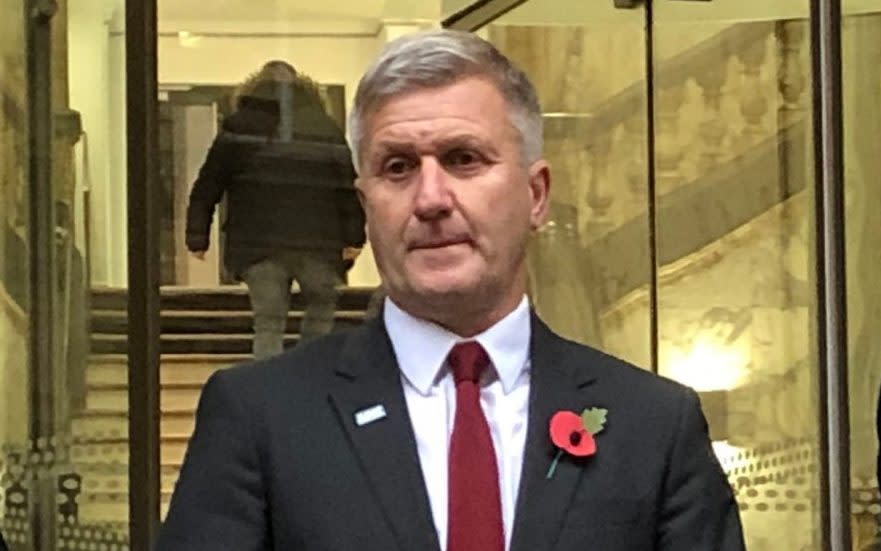Former British Cycling doctor Richard Freeman banned for four years over anti-doping violations

Richard Freeman, the disgraced doctor at the centre of a golden era for British cycling, has been banned for four years from all sports for doping offences.
In a ruling that casts further cloud over British Cycling and Team Sky’s years of dominance, an independent UK Anti-Doping panel ruled that Freeman took possession of a prohibited substance. He also lied twice to Ukad investigators, the panel added.
The key figure behind some of Britain’s most cherished sporting victories in recent decades had already been struck off in 2021 for misconduct after a hearing by the Medical Practitioners Tribunal Service.
The sanction handed to Freeman on Tuesday is the first issued to a member of staff associated with the dominance of British cycling through the previous decade. He was the physician for the British cycling team at both London 2012 and Rio 2016 and when Sir Bradley Wiggins secured victory in the Tour de France by securing time trial gold at the Olympics. Wiggins is not accused of any wrong doing.
Following his medical tribunal, Freeman was charged with two violations by Ukad, with an independent panel now finding he possessed a prohibited substance and tampered with part of doping control. The ban has been backdated to December 22, 2020, the date of his provisional suspension.
A medical tribunal had already found Freeman guilty of ordering performance-boosting testosterone to the national velodrome in 2011 “knowing or believing it was to be administered to an athlete to improve their athletic performance”.
Ukad launched two separate probes against Freeman, as a result, and was urged to retest all samples from the years in which he was at British Cycling.
In a 15-page judgment from Charles Flint KC, he recorded that the panel had found on Tuesday that Freeman “committed the charge of Possession of a Prohibited Substance contrary to 2009 ADR Article 2.6.3 and the first and second Tampering charge contrary to 2015 ADR Article 2.5.”
The tampering charge, he recorded, “carries a four-year period of ineligibility” which “should be deemed to have commenced on 22 December 2020, giving credit to Dr Freeman for the period of Provisional Suspension that he has served to date in accordance with 2015 ADR Article 10.11.3, and will end at 23:59 on 21 December 2024”.
Freeman was previously found guilty by the medical tribunal, on the balance of probability, of ordering a batch of Testogel to the velodrome in 2011 “knowing or believing it was to be administered to an athlete to improve their athletic performance”. He was also found guilty of “concealing” his conduct by orchestrating an elaborate cover-up.
The doctor had claimed he was “bullied” into ordering the drugs by Shane Sutton, the former British Cycling head coach, to treat the Australian’s alleged erectile dysfunction. Sutton vehemently denied he ever suffered from the condition and the tribunal found him to be a credible witness while describing Freeman’s version of events as “implausible”. The Ukad panel supported this verdict.
Sutton has previously said in a statement that he was “saddened” by the affair and disappointed he was used as a “scapegoat” by Freeman. “It has caused great pain to both me and my family,” he said.
In recent months, Freeman chose not to appear before the national anti-doping panel to defend himself. Any party who wishes to appeal the panel’s decision must do so within 21 days.
“The tribunal was comfortably satisfied that Dr Freeman had ‘intended to make available to one or more of his athletes the prohibited substance delivered to the Manchester Velodrome’,” Ukad said in a statement.
“Whilst Dr Freeman had accepted that he had lied to Ukad about returning the Testogel to the supplier, he maintained that he had written to a non-rider member of staff requesting that they waive patient confidentiality and that they had refused to do so. The independent tribunal found that Ukad had also proved the second tampering violation against Dr Freeman whose ‘conduct subverted Doping Control’.”
Jane Rumble, Ukad’s chief executive, said: “This case sends a strong message to all athlete support personnel that the rules apply equally to them, just as they do to athletes, and that they have a clear responsibility to uphold the values of integrity in sport.”
In response to the sanction, British Cycling chair Frank Slevin said: “We have stated previously that Richard Freeman’s conduct during his employment by British Cycling bore no resemblance to the high ethical and professional standards which we, our members and our partners rightly expect.
“We also acknowledge that many will be understandably frustrated, as we are ourselves, that some matters arising from this case and others remain uncertain. We once again want to take this opportunity to urge individuals with relevant information to share that with UK Anti-Doping.”
The governing body added: “We have made great progress in strengthening our provision of medical services to riders competing for the Great Britain Cycling Team.”

 Yahoo Sport
Yahoo Sport 





































